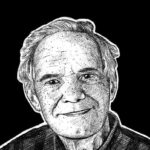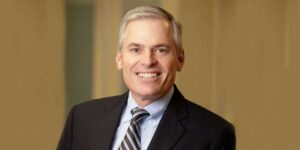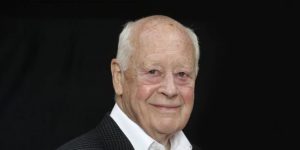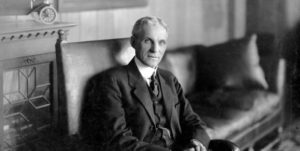John Dewey biography and quotes
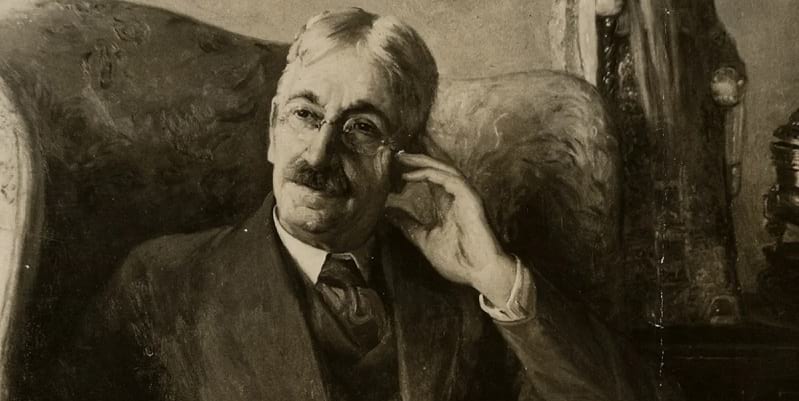
John Dewey (October 20, 1859 – June 1, 1952) was an American philosopher, psychologist, professor and educational reformer. The ideas of John Dewey have been very influential in the field of education. He is known as one of the most prominent American scholars in the early twentieth century. He also co-founded philosophical pragmatism.
Who is John Dewey? His biography
Youth and early career
John Dewey was born in Burlington, Vermont. Father Archibald Sprague Dewey owned a grocery store. Mother Lucina Artemisia Rich Dewey was a strict Calvinist and twenty years younger than her husband.
John was the third of the couple’s four sons. The eldest, John Archibald Dewey, died in infancy.
Also living with the family, was cousin John Parker Rich, who was like a brother to young John. John attended Burlington’s public elementary school, where children studied from both wealthy and poor backgrounds. This ensured that he was exposed to people from different backgrounds at a young age.
The father of the family did not have extreme expectations of his sons, but did instill in them his interest in English and Scottish literature. The boys earned their pocket money by delivering newspapers and magazines. They also worked in a sawmill.
John did very well in school, but often found the program boring and too easy. He completed high school at the age of fifteen and then went on to the University of Vermont, where his brother Davis was already studying.
He began studying philosophy, and was guided by Professor Henry Augustus Pearson Torrey. John graduated in 1879, after which he worked for two years at a high school in Oil City, Pennsylvania. Here he taught the subjects of Latin, algebra and general science, for a salary of forty dollars a month.
Professional career and education theory
After his third year teaching high school in Oil City, John returned to Vermont where he began teaching in an elementary school. He filled his free time studying philosophical issues after which he soon realized that he needed to focus on the field of philosophy.
He decided to get his doctorate in philosophy. He received his doctorate under the supervision of George Sylvester Morris and his thesis was called ‘The Psychology of Kant’.
1884 was the year John Dewey continued his career as an assistant professor of philosophy and psychology at the University of Michigan. During his time at this university he published two books: ‘Psychology‘ in 1887 and ‘Leibniz’s New Essays Concerning the Human Understanding‘ in 1888. In 1888 he left the University of Michigan for the University of Minnesota, where he became professor of philosophy.
When his former teacher George Sylvester Morris died in 1889, he returned to the University of Michigan to take over his position. Initially interested in the classical philosophy of Georg Wilhelm Friedrich Hegel, John Dewey became additionally interested in experimental philosophy, as proposed by William James and G. Stanley Hall.
Together with his colleagues George Herbert Mead and James Hayden Tufts, he made an attempt to reform psychology. Student James Rowland Angell also joined the company. John Dewey took a position at the newly established University of Chicago in 1894.
Along with Hayden Tufts, George Mead and James Angell, he formed the “Chicago Group” of psychology. In the same year, Dewey founded an elementary school: the University Elementary School. His wife Harriet became principal of the school. Dewey’s main reason for starting the elementary school was that it allowed him to test his theories on education.
Two years later he founded a second school, the University of Chicago Laboratory School, a progressive school that taught toddlers and young adults. It was also during this period that he published one of his first groundbreaking publications, called Functional Psychology. In 1899 another publication appeared, ‘The School and Society: Being Three Lectures‘.
In 1903, a collection of four essays was published, entitled ‘Though and Its Subject Matter‘.
A year later, Dewey resigned from the University of Chicago because he had a disagreement with the university’s board. He moved to the east coast of the United States and went to work as a professor of physiology at Columbia University.
The salary was too low to support his family, so in addition, he began teaching at Teacher’s College. He remained doing so until his retirement in 1930. All this time he worked on important research and published many influential works i.e. the John Dewey Theory.
China
In 1919, Dewey went on sabbatical to Japan. From Japan, he went to Peking, at the invitation of the university from that city. In late April of that year, John Dewey reached Shanghai. A few days after his arrival, local students hit the streets to protest against the decision to hand over the Shandong province to Japan.
Dewey was inspired by the movement and stayed in the country until 1921. During his stay, John gave hundreds of lectures, despite the fact that all of his lectures had to be translated.
Important Publications
In 1921, Dewey returned to the United States and published several important works while continuing to teach at Columbia University, including: Human Nature and Conduct from 1922, The Phantom Public from 1925, Experience and Nature from 1925, and The Public and its Problems from 1927.
Dewey retired in 1930, but continued to teach. His last major publication, Knowing the Unknown, appeared in 1949. He participated in various social, political and humanistic activities after his retirement.
He maintained his firm democratic convictions, in both politics and the educational system. Of the more than forty books he wrote, “Democracy and Education“.
Personal life and death of John Dewey
In 1884, John Dewey met philosophy student Harriet Alice Chipman, the woman he would later marry. Although they talked about marriage a year after they met, they waited until she graduated.
The couple had six children. Harriet Alice died in 1927.
In 1946, John Dewey remarried to Estella Roberta Lowitz Grant. She too was a widow and the two knew each other from earlier in their lives. On June 1, 1952, John Dewey died of pneumonia. He lived to be 92 years old.
Famous quotes
- “To me faith means not worrying.”
- “Education is not preparation for life; education is life itself.”
- “Education, therefore, is a process of living and not a preparation for future living.”
- “The belief that all genuine education comes about through experience does not mean that all experiences are genuinely or equally educative.”
- “Arriving at one goal is the starting point to another.”
- “Time and memory are true artists; they remould reality nearer to the heart’s desire.”
- “To find out what one is fitted to do, and to secure an opportunity to do it, is the key to happiness.”
- “Without some goals and some efforts to reach it, no man can live.”
- “The self is not something ready-made, but something in continuous formation through choice of action.”
- “Every great advance in science has issued from a new audacity of imagination.”
- “Failure is instructive. The person who really thinks learns quite as much from his failures as from his successes.”
- “No man’s credit is as good as his money.”
- “Luck, bad if not good, will always be with us. But it has a way of favoring the intelligent and showing its back to the stupid.”
- “Such happiness as life is capable of comes from the full participation of all our powers in the endeavor to wrest from each changing situations of experience its own full and unique meaning.”
- “Skepticism: the mark and even the pose of the educated mind.”
- “One lives with so many bad deeds on one’s conscience and some good intentions in one’s heart.”
- “By object is meant some element in the complex whole that is defined in abstraction from the whole of which it is a distinction.”
Books and publications by John Dewey et al.
- 2008. Knowing and the Known. In J. A. Boydston
- 2005. Art as experience. New York: Perigree.
- 2005. How we think. New York: Barnes & Noble
- 2000. Liberalism and social action. Amherst: Prometheus Books.
- 1997. The need for a recovery of philosophy. In L. Menand (Ed.), Pragmatism: A reader. New York: Vintage
- 1997. Experience and education. New York: Touchstone.
- 1989. Freedom and culture. Amherst NY: Prometheus Books.
- 1984. Individualism old and new. Amherst NY: Prometheus Books.
- 1981. The philosophy of John Dewey.
- 1966. Democracy and education. New York: The Free Press.
- 1963. The school and society. Chicago: The University of Chicago Press.
- 1963. The child and the curriculum. Chicago: The University of Chicago Press.
- 1958. Experience and nature. Mineola NY: Dover
- 1950. Aesthetic experience as a primary phase and as an artistic development. The Journal of Aesthetics and Art Criticism, 9(1), 56–58.
- 1944. By nature and by art. The Journal of Philosophy, 41(11), 281–292.
- 1939. John Dewey’s philosophy. J. Ratner (ed.). New York: The Modern Library.
- 1937. Education and social change. Bulletin of the American Association of University Professors, 23(6), 472–474.
- 1935. The future of liberalism. The Journal of Philosophy, 32(9), 225–230.
- 1931. George Herbert Mead. The Journal of Philosophy, 28(12), 309–314.
- 1927. The rôle of philosophy in the history of civilization. The Philosophical Review, 36(1), 1–9.
- 1910. The influence of Darwin on philosophy and other essays. New York: Henry Holt and Company.
- 1910. William James.The Journal of Philosophy, Psychology and Scientific Methods, 7(19), 505–508. J. Baldacchino
- 1905. The realism of pragmatism. The Journal of Philosophy, Psychology and Scientific Methods, 2(12), 324–327.
- 1903. The philosopher of democracy. International Journal of Ethics, 13(4), 405–413.
- 1893. The superstition of necessity. The Monist, 3(3), 362–379.
How to cite this article:
Janse, B. (2022). John Dewey. Retrieved [insert date] from Toolshero: https://www.toolshero.com/toolsheroes/john-dewey/
Original publication date: 03/08/2022 | Last update: 04/13/2023
Add a link to this page on your website:
<a href=”https://www.toolshero.com/toolsheroes/john-dewey/”>Toolshero: John Dewey</a>






